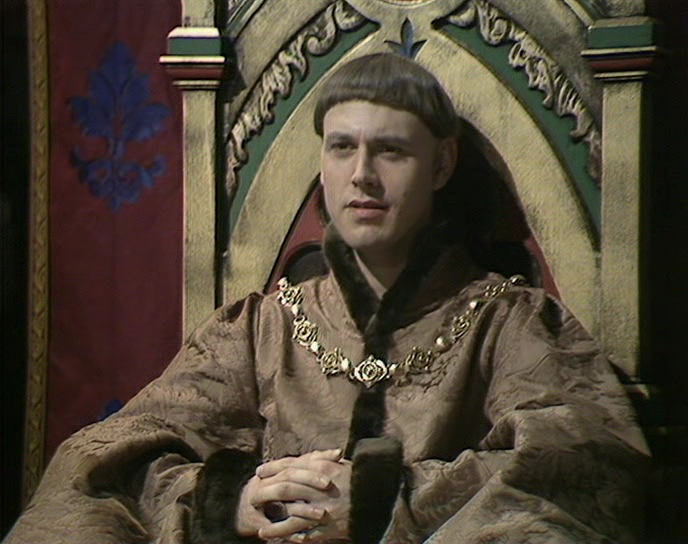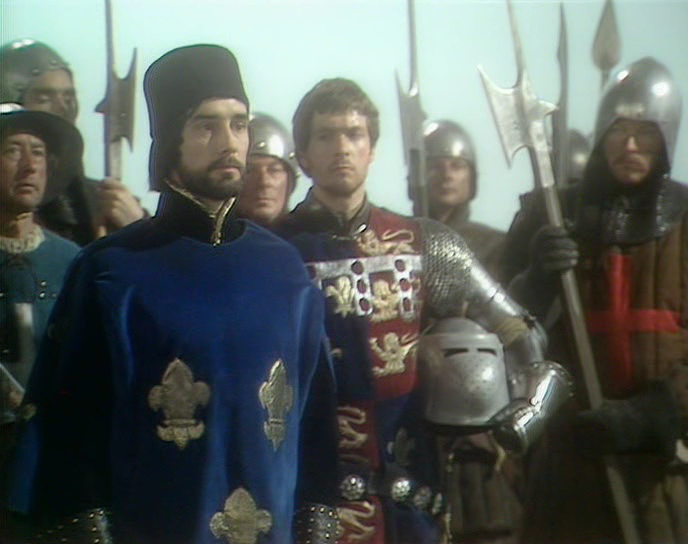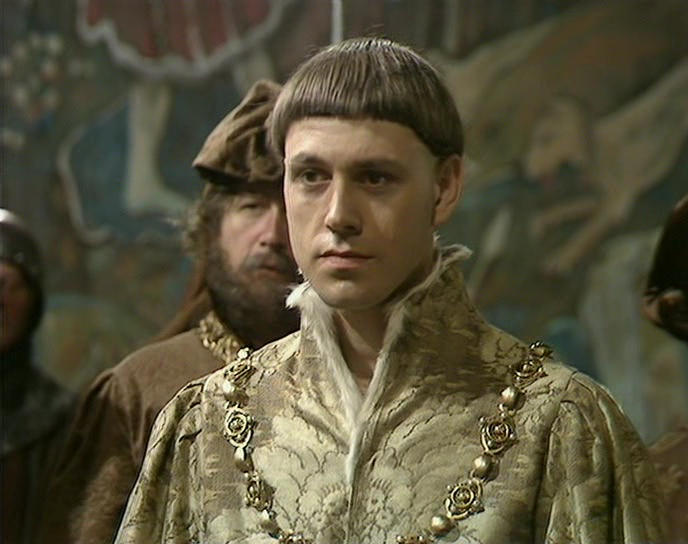

Making its debut with Romeo and Juliet on 3 December 1978, and concluding nearly seven years later with Titus Andronicus on 27 April 1985, the BBC Television Shakespeare project was the single most ambitious attempt at bringing the Bard of Avon to the small screen, both at the time and to date.
Producer Cedric Messina was already an experienced producer of one-off television Shakespeare presentations, and was thus ideally qualified to present the BBC with a daunting but nonetheless enticingly simple proposition: a series of adaptations, staged specifically for television, of all 36 First Folio plays, plus Pericles (The Two Noble Kinsmen was considered primarily John Fletcher's work, and the legitimacy of Edward III was still being debated).
The scale of Messina's proposal, far greater than that of previous multi-part Shakespeare series such as An Age of Kings (BBC, 1960) and Spread of the Eagle (BBC, 1963), required an American partner in order to guarantee access to the US market, deemed essential for the series to recoup its costs. Time-Life Television agreed to participate, but under certain controversial conditions - that the productions be traditional interpretations of the plays in appropriately Shakespearean period costumes and sets, designed to fit a two-and-a-half-hour time slot.
The running-time requirement was swiftly jettisoned when it became clear that the major tragedies in particular would have suffered severely, but other artistic restrictions remained largely in place throughout. Although later productions under Messina's successors Jonathan Miller and Shaun Sutton would be more experimental, Miller was unable to persuade first-choice directors such as Peter Brook and Ingmar Bergman to take part, and Michael Bogdanov resigned from Timon of Athens (eventually tx, 4/16/1981, with Miller himself directing) after his modern-dress interpretation was considered too radical a departure.
This gave the BBC Television Shakespeare cycle the reputation of being overly staid and conventional, which was not always deserved. Though Messina's own productions (1978-80) were largely conservative, Jonathan Miller (1980-82) revamped things both visually (thanks to a design policy of sourcing sets and costumes from great paintings of the era in which the play was set) and in terms of direction and casting, in some cases using popular actors with little or no Shakespeare experience (John Cleese as Petruchio, Bob Hoskins as Iago) to attract new and younger audiences.
Under Miller, directors such as Jack Gold, Jane Howell and Elijah Moshinsky were encouraged to be more adventurous, with Howell in particular adopting such a stylised approach for The Winter's Tale (tx. 8/2/1981) and the Henry VI/Richard III cycle (tx. 2-23/1/1983) that they pushed the definition of "traditional" to the limit, but also garnered the series some of its best reviews. Miller's aesthetic policies continued under Shaun Sutton (1982-85), who brought the project to a belated close.
Whatever its artistic reputation, there was no doubt that the BBC Television Shakespeare was a commercial triumph, breaking even financially by 1982 (ahead of expectations) and fully justifying Messina's gamble. Its success was helped by the rapid growth of video recorders in schools, creating a secondary market that was much bigger than initially predicted - though the initial decision to sell the plays only as a complete set provoked complaints from people who baulked at paying the substantial asking price because they were after a smaller selection or individual titles. The BBC eventually released some of the more popular titles separately, but it was not until late in 2005 that the entire series was available individually on DVD at a competitive price.
Although the BBC Television Shakespeare project as a whole met with a mixed reception, it had several positive virtues. Chief among them was the fact that its completist remit meant that several of the more obscure plays received their first television adaptation, and in most cases the BBC version remains the only one. Happily, such productions as Henry VIII (tx. 25/2/1979), Cymbeline (tx. 10/7/1983), Pericles (tx. 11/6/1984) and Titus Andronicus were considered amongst the cycle's most impressive achievements, with Henry VIII subsequently voted the best production of all by the Shakespeare Association of America.
A complete list of BBC Television Shakespeare productions is as follows:
Series One (producer: Cedric Messina): Romeo and Juliet (tx. 3/12/1978), Richard II (tx. 10/12/1978), As You Like It (tx. 17/12/1978), Julius Caesar (tx. 11/2/1979), Measure For Measure (tx. 18/2/1979), Henry VIII (tx. 25/2/1979)
Series Two (p. Cedric Messina): Henry IV Part One (tx. 9/12/1979), Henry IV Part Two (tx. 16/12/1979), Henry V (tx.23/12/1979), Twelfth Night (tx. 6/1/1980), The Tempest (tx. 27/2/1980), Hamlet (tx. 25/5/1980).
Series Three (p. Jonathan Miller): The Taming of the Shrew (tx. 23/10/1980), The Merchant of Venice (tx. 17/12/1980), All's Well That Ends Well (tx. 4/1/1981), The Winter's Tale (tx. 8/2/1981), Timon of Athens (tx. 16/4/1981), Antony and Cleopatra (tx. 8/5/1981)
Series Four (p. Jonathan Miller): Othello (tx. 4/10/1981), Troilus and Cressida (tx. 7/10/1981), A Midsummer Night's Dream (tx. 13/12/1981)
Series Five (p. Jonathan Miller, Shaun Sutton): King Lear (tx. 19/9/1982), The Merry Wives of Windsor (tx. 28/12/1982), Henry VI Part One (tx. 2/1/1983), Henry VI Part Two (tx. 9/1/1983), Henry VI Part Three (tx. 16/1/1983), Richard III (tx. 23/1/1983), Cymbeline (tx. 10/7/1983)
Series Six (p. Shaun Sutton): Macbeth (tx. 17/10/1983), The Comedy of Errors (tx. 24/12/1983), The Two Gentlemen of Verona (tx. 27/12/1983), Coriolanus (tx. 21/4/1984), Pericles (tx. 11/6/1984)
Series Seven (p. Shaun Sutton): King John (tx. 24/11/1984), Much Ado About Nothing (tx. 30/11/1984), Love's Labour's Lost (tx. 5/1/1985), Titus Andronicus (tx. 27/4/1985)
The BBC also produced Shakespeare in Perspective, an accompanying series of 25-minute personal introductions to individual plays by an eclectic range of presenters from the literary (Anthony Burgess, Dennis Potter, Jilly Cooper) to the scholarly (Germaine Greer, Frank Kermode, Michael Wood) to the celebrity (Roy Hudd, George Melly, Barry Took). These usually took the form of straight-to-camera addresses from assorted locations with some connection to the play, which were intercut with extracts from the accompanying BBC Shakespeare production, usually screened later that evening.
Michael Brooke
For the BBC Television Shakespeare, tx. 23/12/1979, colour, 166 mins
Director David Giles
Production Companies BBC Television, Time-Life Television
Producer Cedric Messina
Script Editor Alan Shallcross
Designer Don Homfray
Music Adviser David Lloyd-Jones
Cast: David Gwillim (King Henry V), Alec McCowen (Chorus), Jocelyne Boisseau (Katherine), Thorley Walters (King Charles VI), Julian Glover (Constable of France)
The triumphant reign of King Henry V, uniter of his kingdom and conqueror of the French at Agincourt.

The BBC Television Shakespeare's Henry V was broadcast on 23 December 1979, at the end of a four-week series covering the whole of Shakespeare's second history cycle. All four plays were directed by David Giles and given a traditional staging in the studio, though the battle scenes suffered from production values better suited to the more intimate Richard II and Henry IV Part II.
The chronological sequence gave television audiences the first chance to see a single actor shift from Prince Hal into King Henry since Robert Hardy in An Age of Kings (BBC, 1960). But while Hardy's bluff and hearty rendition was arguably more convincing as decisive monarch than callow youth, David Gwillim's Henry is a clear development from his younger self. At the end of Henry IV Part II Hal suggested an abrupt change of demeanour to something more regal, but in the early scenes of Henry V his inexperience is clear, as is his eagerness to seek advice from all quarters before reaching a firm decision on the question of France. He plays the warrior-king, but we know it's essentially a performance - even the scar on his cheek acts as a permanent aide-mémoire of a wound suffered at the end of Henry IV Part I.

While it is easy to accept a one-off production such as Laurence Olivier's film (1944) as presenting an image of unvarnished heroism, David Giles pointed out that: "he was only playing Henry V, he wasn't playing Hal as well. If you've played Hal the boy, you can't quite do that" - and he restores material that Olivier tellingly omitted, notably the scene where Henry orders the killing of French prisoners of war. However, Gwillim delivers this almost as a throwaway line, as though he's ashamed of himself for saying it - and one of the few major cuts to the text occurs in his speech to the citizens of Harfleur, where 27 lines of threatening invective in which he denies responsibility for his soldiers' actions have been discreetly removed.

In general, though, significantly more of Shakespeare's original play is included than was the case with Olivier, An Age of Kings or the later Kenneth Branagh film (1989), making this Henry V a valuable record, for all its limitations as spectacle. Gwillim is very much the star, but Alec McCowen makes a rousing Chorus, and newcomer Jocelyne Boisseau delivers a touching (and authentically French) Katherine.
Michael Brooke
http://rapidshare.com/files/117419532/HENRY_V_BBC.part01.rar
http://rapidshare.com/files/117420049/HENRY_V_BBC.part02.rar
http://rapidshare.com/files/117420447/HENRY_V_BBC.part03.rar
http://rapidshare.com/files/117420902/HENRY_V_BBC.part04.rar
http://rapidshare.com/files/117421319/HENRY_V_BBC.part05.rar
http://rapidshare.com/files/117421804/HENRY_V_BBC.part06.rar
http://rapidshare.com/files/117422336/HENRY_V_BBC.part07.rar
http://rapidshare.com/files/117422875/HENRY_V_BBC.part08.rar
http://rapidshare.com/files/117423291/HENRY_V_BBC.part09.rar
http://rapidshare.com/files/117423737/HENRY_V_BBC.part10.rar
http://rapidshare.com/files/117424225/HENRY_V_BBC.part11.rar
http://rapidshare.com/files/117424691/HENRY_V_BBC.part12.rar
http://rapidshare.com/files/117424782/HENRY_V_BBC.part13.rar
no pass



0 comments:
Post a Comment